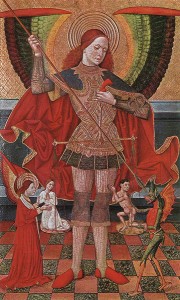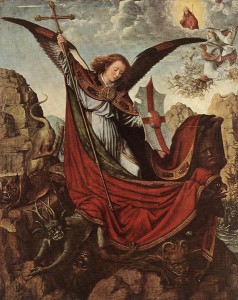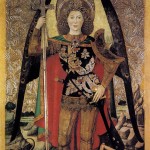
ABADIA, Juan de la, The Archangel Michael, c. 1490, Wood, 127 x 78 cm, Museu Nacional d'Art de Catalunya, Barcelona
“Who is like unto God!” thundered the great Archangel when Lucifer revolted against God, and, as the Bible tells us and the Church affirms, “There was war in Heaven.” Defeated, Lucifer fell to the pit wherein he now resides, and St. Michael (which means, literally, “Who is like unto God?”), at his Divine Sovereign’s command, has continued the war on Earth ever since. Under the Old Covenant, he was the special Guardian of the Jewish People; under the New, he occupies the same function toward the Church. Nor is this conflict merely the clash of arms; he plays the same role for every member of the Church, which is why he is invoked by and for the dying.
Not surprisingly, he was taken as a special patron by knights and crusaders and to him was attributed victory in several key battles. St. Michael has appeared numerous times to various favored folk — often resulting in either or both a liturgical commemoration and shrine. In 1751, the Great Archangel appeared to a Portuguese nun, Antonia d’Astonaco, and asked to her to pray a chaplet in his honor. This private revelation was approved by Bl. Pius IX in 1851. His successor, Leo XIII, himself had a vision of the Archangel and the horrors of the final days which would face the Church. In response, he composed two prayers invoking Michael’s aid, the shorter of which was recited after Low Mass until 1970, and continues to be wherever the Extraordinary Form of the Roman Rite is used.
Devotion to St. Michael is a great unifying factor in the Church, as every one of the Liturgical Rites, East and West, invokes his aid, albeit in different ways and on different days. In the West, his major feats day is September 29, popularly called “Michaelmas.” Originally the feast of the dedication of a major church to him in Rome, it has since 1969 been shred by him with the other two Archangels named in the Bible — Ss. Gabriel and Raphael. Until that year, he had a second feast as well (still observed in the Extraordinary Form), the commemoration of his apparition at Italy’s Monte Gargano on May 8. France observed a local feast, his apparition at Mont St. Michel on October 16. The Byzantine Rite celebrates his major feats on November 8, but the have a few others — as do the Copts, Armenians, Maronites, and so on.
HUGUET, Jaume, The Archangel St Michael, 1456, Tempera on panel, 213 x 136 cm, Museu Nacional d'Art de Catalunya, Barcelona
First of all there is Michael. We find him in Sacred Scripture above all in the Book of Daniel, in the Letter of the Apostle St Jude Thaddeus and in the Book of Revelation.
Two of this Archangel’s roles become obvious in these texts. He defends the cause of God’s oneness against the presumption of the dragon, the “ancient serpent”, as John calls it. The serpent’s continuous effort is to make men believe that God must disappear so that they themselves may become important; that God impedes our freedom and, therefore, that we must rid ourselves of him.
>However, the dragon does not only accuse God. The Book of Revelation also calls it “the accuser of our brethren…, who accuses them day and night before our God” (12: 10). Those who cast God aside do not make man great but divest him of his dignity. Man then becomes a failed product of evolution. Those who accuse God also accuse man. Faith in God defends man in all his frailty and short-comings: God’s brightness shines on every individual. It is the duty of the Bishop, as a man of God, to make room in the world for God, to counter the denials of him and thus to defend man’s greatness. And what more could one say and think about man than the fact that God himself was made man? Michael’s other role, according to Scripture, is that of protector of the People of God (cf. Dn 10: 21; 12: 1). Dear friends, be true “guardian angels” of the Church which will be entrusted to you! Help the People of God whom you must lead in its pilgrimage to find the joy of faith and to learn to discern the spirits: to accept good and reject evil, to remain and increasingly to become, by virtue of the hope of faith, people who love in communion with God-Love.
Without a doubt, as in every period of crisis facing the Church and the World, devotion to St. Michael is an essential act of self-preservation today. As did our ancestors, we need to call on him to defend our Faith, our country, and our own souls against the Great Enemy and all — human or angel — who do his will. It is not a question of some quaint Medievalism or poetic practice, but of unrelenting reality: that reality which has shaped our world since before it began.
Links
- St. Michael in The Catholic Church
http://en.wikipedia.org/wiki/Saint_Michael_(Roman_Catholic) - St. Michael
http://en.wikipedia.org/wiki/Michael_(archangel) - Chaplet of St. Michael
http://www.ewtn.com/devotionals/prayers/chaplet-of-st-michael.htm - St. Michael Shrine, Monte Gargano
http://www.gargano.it/sanmichele/english/home-en.htm - Sagra Di S. Michele, Piedmmont
http://www.sacradisanmichele.com/ - Santuario San Miguel, Aralar, Spain
http://www.aralar-excelsis.info/ - Abbaye Mont-Saint-Michel
http://abbayedumontsaintmichel.cef.fr/ - Rocher Saint Michel
http://www.rochersaintmichel.fr/ - St. Michael’s Mount
http://www.stmichaelsmount.co.uk/ - Skellig Michael
http://www.dioceseofkerry.ie/page/heritage/holy-places/skellig/ - San Miguel Del Milagro, Tlaxcala
http://www.corazones.org/lugares/latino_a/mexico/san_miguel_mil/miguel_milagro.htm - Milizia S. Michele
http://www.miliziadisanmichelearcangelo.org/

